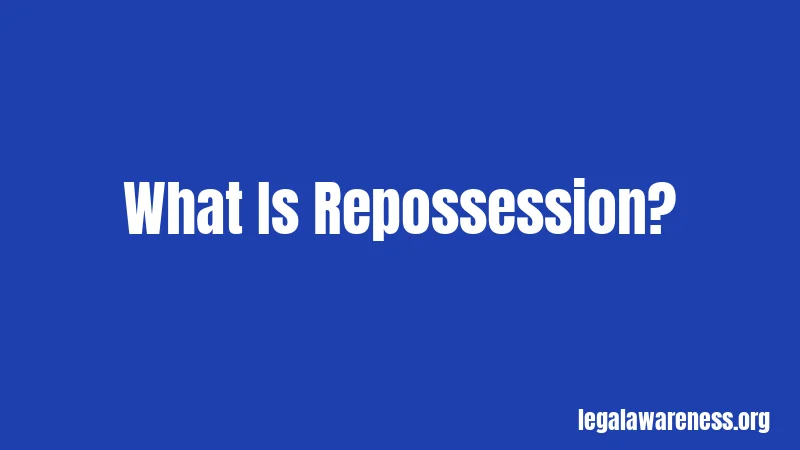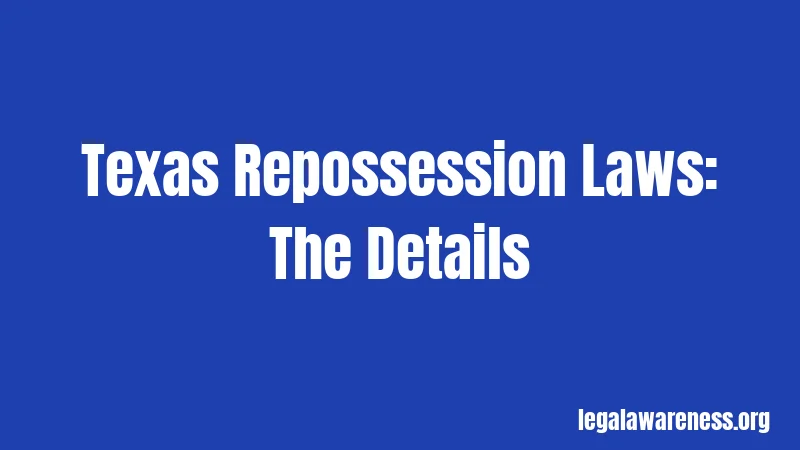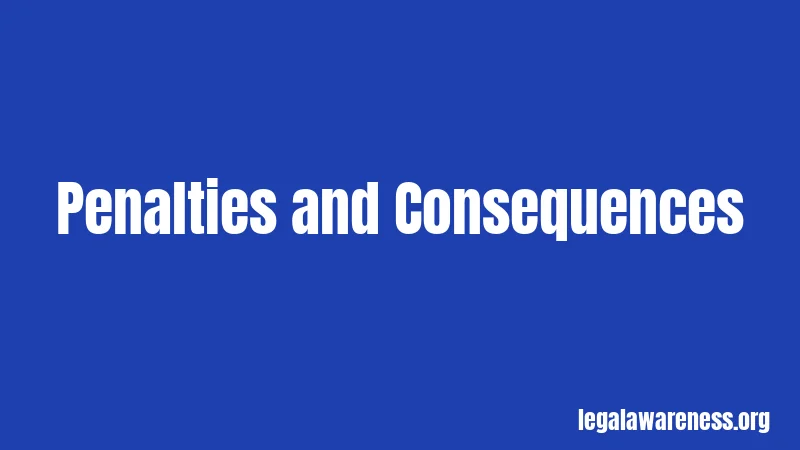Texas Repossession Laws in 2026: Your Rights and Protections
Most people don’t think about repossession until it’s too late. But in Texas, understanding these laws could save you thousands of dollars and a ton of stress. The good news? Texas has some strong protections for borrowers. The better news? They’re not that hard to understand.
Repossession happens when a lender takes back your car, boat, or other property because you missed payments. Sounds straightforward, right? But Texas law is pretty detailed about how lenders can do this and what they absolutely cannot do. Let’s break down exactly what you need to know.
What Is Repossession?

Repossession is when a creditor or lender takes back property you promised to pay for. Usually, this happens with cars. But it can also apply to boats, motorcycles, RVs, and other financed items.
Here’s the basic idea. You borrow money to buy something. You sign an agreement saying the lender can take the item back if you don’t pay. That agreement is your loan or financing contract. When you stop making payments, the lender has the legal right to repossess the property.
Pretty straightforward, right? But here’s where it gets important. Texas law sets strict rules about HOW lenders can repossess. They can’t just show up and take whatever they want. There are procedures they must follow.
Texas Repossession Laws: The Basics
What Lenders Can Do
In Texas, a lender can repossess your vehicle if you’re in default on your loan. Default typically means you’ve missed one payment. Some contracts require you to miss multiple payments first. Check your specific loan agreement to see what counts as default for you.
The lender doesn’t need to give you a warning before repossessing. They don’t need to tell the police. They can legally come take the vehicle without prior notice. That’s the law in Texas.
Wait, but there’s an important limit here. The lender cannot breach the peace during repossession. This is huge. Basically, they can’t do anything violent, threatening, or illegal to take your car. No breaking into your garage. No using force. No intimidation. If they do, you could have a legal claim against them.
What Lenders Cannot Do
Here’s where Texas gives you real protection. Lenders must follow specific rules when they repossess your vehicle. This isn’t optional. It’s the law.
A repossession agent cannot break into your home or a locked garage to get your car. They cannot use physical force or threats. They cannot damage your property while removing the vehicle. They cannot trespass on someone else’s property without permission. If they do any of these things, they’ve broken the law.
Also, the lender must not misrepresent who they are. They can’t pretend to be police or government officials. They can’t use deceptive practices to get you to hand over your keys.
Wondering if a lender has crossed the line? If you felt threatened, if they damaged property, or if they acted illegally, you may have a case. Keep records of what happened. Get witness names. Document everything.
Texas Repossession Laws: The Details

Right to Cure (The Second Chance)
Here’s one of the best parts of Texas law. You have a right to catch up on missed payments. This is called the right to cure.
If you miss a payment, you can usually call your lender and catch up. Pay what you owe plus any late fees. The lender has to accept your payment and drop the repossession. You get a second chance.
But here’s the catch. Once the lender actually repossesses your vehicle, this right goes away. You can’t cure after they’ve already taken it back. So act fast if you’re behind on payments.
Also, some loan agreements say you lose the right to cure if you miss two or more payments. Or they might set other conditions. That’s why reading your contract matters.
Notice Requirements
After your vehicle is repossessed, the lender must give you notice. Texas law is pretty specific about this. The lender must send you a written notice telling you what happened and what happens next.
The notice must include certain information. It should explain how much you owe, what fees will be charged, and when your vehicle will be sold. It should tell you how to get your vehicle back before the sale. The lender must send this notice within a reasonable time after repossession.
Honestly, this notification requirement exists to protect you. It’s your chance to redeem the vehicle, which means paying off what you owe before it’s sold.
Redemption: Getting Your Vehicle Back
After repossession, you have a right called redemption. This means you can get your vehicle back by paying off the entire loan balance plus repossession costs and storage fees.
Think of it like this. Your vehicle is sold at an auction later. Before that auction happens, you can reclaim your car by paying everything you owe. Once the car sells, this option is gone.
How long do you have? That depends on the specific loan agreement and circumstances. Some agreements give you 10 days. Others might give you more. Check your contract or ask your lender what timeline applies to you.
What costs do you have to pay? You owe the full loan balance, repossession costs (usually $200-$500), and daily storage fees (often $15-$30 per day). These add up fast. But if you can pay these costs, you keep your vehicle.
What Happens to Your Vehicle After Repossession?
The Sale Process
Once your vehicle is repossessed and you don’t redeem it, the lender will sell it. Texas law requires the lender to sell the vehicle in a “commercially reasonable manner.” This is important.
Commercially reasonable means the lender must try to get a fair price. They can’t just sell it for nothing to someone they know. They can’t deliberately undervalue the vehicle. They have to act in good faith.
The lender might sell it at a public auction. They might sell it to a dealer. They might sell it privately. Any of these methods can be reasonable, depending on the circumstances.
The lender will notify you when and where the vehicle will be sold. This gives you one last chance to redeem it before the sale happens.
Deficiency: When You Still Owe Money
Here’s where things get serious. After the lender sells your repossessed vehicle, they calculate what they got for it. If the sale price is less than what you still owe, you have a deficiency.
Let’s say you owe $15,000 on your car. Your vehicle gets repossessed and sold for $12,000. The deficiency is $3,000. You still owe that money.
In Texas, the lender can sue you for the deficiency. If they win, you could owe judgment and court costs on top of the $3,000. This could show up on your credit report. Wage garnishment could happen. This is serious.
The good news? The lender must act in a commercially reasonable way when selling your vehicle. If they don’t, you can argue against the deficiency in court. You might be able to reduce what you owe.
Penalties and Consequences

What You Could Face
If your vehicle gets repossessed, the consequences go beyond just losing your car. Your credit score will take a major hit. A repossession stays on your credit report for seven years.
This affects your ability to borrow money in the future. Getting a new car loan will be harder and more expensive. Your credit card rates might go up. Even renting an apartment could become difficult.
You might also face legal consequences. The lender could sue you for the deficiency. If they win, a judgment goes on your record. Wage garnishment could start. Debt collectors might contact you.
Impact on Your Credit
A repossession is one of the worst things that can happen to your credit. It’s worse than a missed payment. It’s worse than a late payment. Only a foreclosure or bankruptcy ranks lower.
Your credit score could drop 100+ points immediately. This makes everything more expensive. You’ll pay higher interest rates on everything. You’ll have a harder time qualifying for loans.
Special Circumstances in Texas
If You’re in the Military
Active duty military members get extra protection under federal law. The Servicemembers Civil Relief Act limits repossession during active duty and for 9 months after discharge.
If you’re active duty military, a lender cannot repossess your vehicle without getting court permission first. They have to get a court judgment. This gives you time to deal with the repossession through the legal system.
If you think you qualify for this protection, tell your lender immediately. Provide proof of active duty service.
Vehicle Repossession vs. Other Property
Texas law treats vehicle repossession a bit differently than repossession of other items. The rules are stricter for vehicles because they’re considered essential property.
For other items like boats or electronics, the rules are similar but sometimes less protective. If you’re financing something other than a vehicle, ask your lender about their specific repossession policies.
How to Avoid Repossession
Stay in Contact with Your Lender
Okay, this one’s important. If you’re struggling to make payments, call your lender NOW. Don’t wait.
Lenders often prefer to work with borrowers rather than repossess vehicles. Repossession is expensive for them. They’d rather modify your loan, lower your payment, or defer a payment.
Tell your lender what’s happening. Lost your job? Tell them. Medical emergency? Tell them. They might offer options you didn’t know existed.
Catch Up on Payments
Remember that right to cure we talked about? Use it. If you can scrape together money to catch up, do it. Pay the missed amount plus any late fees.
Get proof of your payment. Make sure the lender receives it. Confirm that your account is current. This stops repossession in its tracks.
Loan Modification or Refinancing
Sometimes you can modify your existing loan. Ask your lender if they’ll extend the loan term to lower your monthly payment. This gives you breathing room.
Or you could refinance the vehicle with a different lender. A new loan pays off the old one. Your new payment might be lower. You might get better terms.
This only works if your credit is decent and you have some equity in the vehicle.
Get Legal Help
If you’re facing repossession, consider talking to a lawyer. Many Texas attorneys offer free consultations. Some specialize in consumer protection.
A lawyer can review your loan agreement. They can check if the lender followed all the rules. They can help you understand your options. They might be able to negotiate with your lender.
Frequently Asked Questions
Can a repossession agent come on my property without permission?
They can enter a public area like a driveway or street to repossess your vehicle. But they cannot break into a locked garage, enter your home, or ignore “no trespassing” signs. If they do, they’ve breached the peace and you may have a legal claim.
How long does a repossession stay on my credit report?
A repossession stays on your credit report for seven years from the date it first appeared. After seven years, it must be removed. Until then, it significantly damages your credit score.
Can I get my car back after repossession?
Yes, through redemption. You can pay off the entire loan balance plus repossession and storage costs before the vehicle is sold. Once it sells at auction, redemption is no longer available.
What if the lender sells my car for less than I owe?
The difference is called a deficiency. In Texas, the lender can sue you for the deficiency amount. If they win, you owe a judgment plus court costs, which adds to your debt.
Does my lender have to give me notice before repossessing?
No. In Texas, a lender does not have to give advance notice. They can repossess without warning. However, they must send you notice AFTER repossession, explaining what happens next.
Final Thoughts
Understanding Texas repossession laws puts you in control. You now know your rights. You know what lenders can and cannot do. You know how to protect yourself.
If you’re struggling with car payments, don’t ignore the problem. Contact your lender immediately. Explore options like loan modification or catch-up plans. If things get serious, talk to a lawyer.
Remember, repossession is serious, but it’s not inevitable. You have more power than you might think. Use these protections. Stay informed. When in doubt, reach out to a legal professional who understands Texas law.
